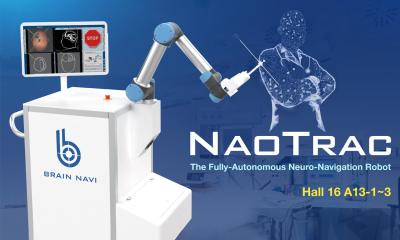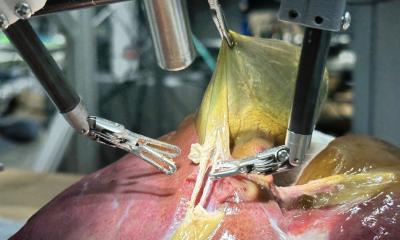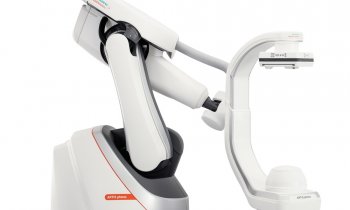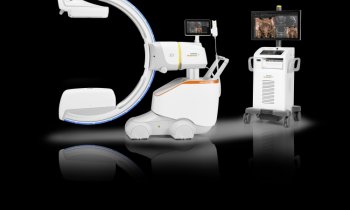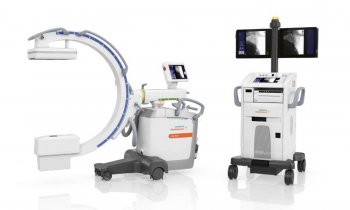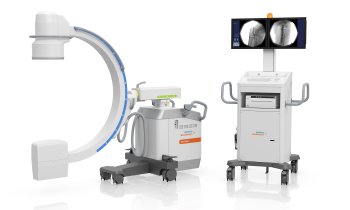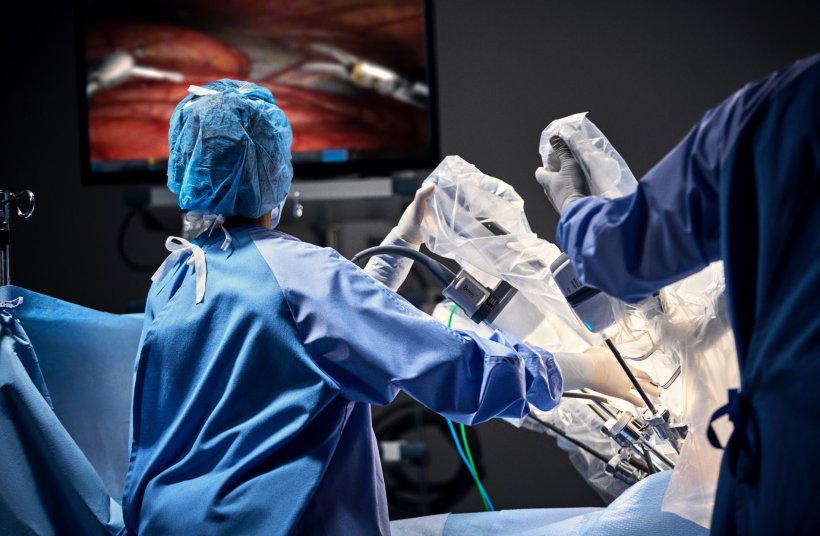
© Intuitive Surgical Operations, Inc.
Article • Compared to laparoscopy
Robotic surgery improves colorectal surgery outcomes
When colorectal surgery was first performed with robotic assistance in 2014, the procedure was questioned about safety, efficacy, and outcomes. Today it is an established option. Well-trained surgeons use robotic surgical systems confidently. Numerous clinical studies have verified its intraoperative benefits for patients and surgeons alike, as well as very positive outcomes for patients.
Report: Cynthia E. Keen
Findings from recent clinical studies conducted in Europe and the United States comparing the outcomes of patients having robotic colorectal surgery with those having conventional laparoscopic surgery and the surgical costs reinforce that the use of robotic surgery produces improved outcomes for patients during both with respect to the surgery and recovery. Surgeons also benefit.
However, robotic surgery takes about 20-30% more time in the operating room to perform and is much costlier than conventional laparoscopy. However, the combination of increased use of the robotic platform for surgeries will reduce per procedure cost, and increasingly sophisticated integrated artificial intelligence (AI) technology integrated into it is expected to reduce operative time. These factors would lower barriers to adoption and implementation by hospitals and motivate surgeons to invest in the lengthy and extensive training programme to become skilled in its use.
Robotic surgery systems offer the advantages of an immersive 3D magnification to enhance depth perception, a stable camera platform, articulating wrists with seven degrees of freedom, bimanual improved dexterity and instrument control, and improved ergonomics. A robotic system provides easier access to narrow places, enables more precise and complex movements, and facilitates the performance of complex procedures.
Colorectal cancer is the third most common cancer in the world. Over 1.9 million new cases were estimated in 2020 and 2022, based on the GLOBOCAN database of 185 countries.1 Researchers estimate an increase to 3.2 million new cases by 2040.2
Recommended article

Article • Focus topic
Robotics in healthcare
From science-fiction to powerful medical tool: Robots perform an increasing number of valuable tasks in healthcare settings. From surgical robotics to applications in patient care – medical robots are here to stay. Keep reading for latest developments and exciting new areas of deployment for this technology.
More “textbook outcomes”
Researchers at UT Southwestern Medical Center in Dallas, Texas, US, evaluated the perioperative outcomes of patients having right colectomy (RC), left colectomy (LC), and rectal cancer surgeries based on “textbook outcomes”, criteria that includes the absence of 30-day complications, a length of stay (LOS) less than five days, and hospital readmission. They matched rectal surgery patients having rectal surgery 1:1 with respect to having laparoscopic versus robotic surgery. Patients having right or left colectomies were matched 2:1. A total of 26,133 patients from a cohort of 53,209 were selected from a national database.
Principal investigator Patricio M. Polanco, MD, and colleagues compared baseline preoperative characteristics, intraoperative outcomes (such as number of lymph nodes harvested, unplanned conversion to open surgery, and operative time), and postoperative outcomes. The latter included textbook outcome, anastomotic leak, postoperative ileus (the inability to contract), LOS five days and longer, readmissions within 30 days, complications, and mortality.
They reported in the World Journal of Surgical Oncology3 that robotic surgery was associated with a higher rate of all “textbook outcomes” compared to laparoscopy in RC and LC, at 71% versus 64% respectively in RC, and 75% versus 68% in LC. Robotic resection also had a lower conversion rate to open surgery. Overall complication rates, anastomotic leaks, the number of bleeding transfusion occurrences within 72 hours, major morbidity, and 30-day mortality were comparable.
Both approaches produced near comparable results for rectal surgery, although robotic resection had a significantly lower conversion rate of 3.9% compared to 10.4% for laparoscopic surgery. However, robotic surgery had a higher rate of major morbidity, postoperative ileus, and anastomotic leak.
Robotic surgery took a much longer time to perform for all procedures, with a mean operative time of 225 minutes compared to 177 minutes in laparoscopy.
A small comparative study of 83 colorectal cancer patients having 46 robotic and 37 laparoscopic resections performed at University Medical Centre Ljubljana in Slovenia showed that none of the patients having robotic surgery required any transfusions or conversion to open surgery, compared to five (13.5%) and six (16.2%) patients respectively in the laparoscopy group. Patients in the laparoscopy group also stayed in the hospital one additional day. Complication rates were comparable. According to first author Jan Grosek MD, and colleagues, this study was unique because two highly experienced surgeons performed all the surgeries using both surgical techniques.4
Comparing clinical and financial outcomes
Rectal cancer represents 28% to 35% of all colorectal cancer cases. The surgery – radical resection by sphincter-preserving rectal resection with total mesorectal excision (TME) – requires a meticulous surgical technique with little margin of error. The instruments used in laparoscopic surgery have inherent limitations in TME, requiring a higher intraoperative conversion rate to open surgery than RC and LC.
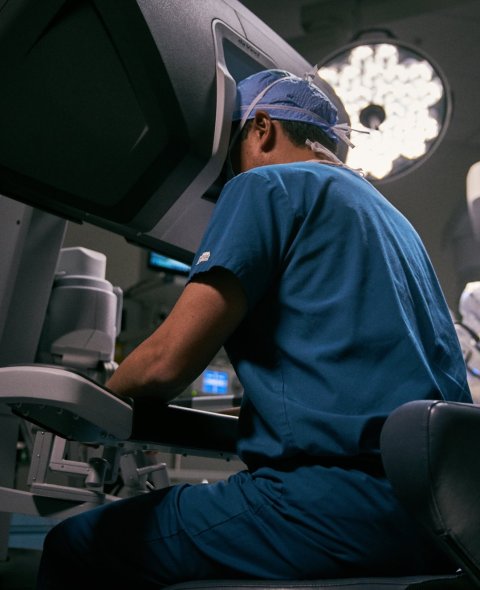
© Intuitive Surgical Operations, Inc.
Researchers at Charité University Medicine Berlin, Germany, a referral centre for colorectal surgery, hypothesized that robotic-assisted surgery would reduce the open surgery conversion rate, shorten LOS, and improve the quality of TME. First author Jasper Max Gebhardt, MD, and colleagues retrospectively analyzed data from 125 consecutive patients, 66 undergoing robotic surgery. Patients had been selected for either procedure based on equipment (Da Vinci X Surgical System, Intuitive Surgical, Mountain View, California) availability.
The study’s primary endpoint focused on the rate of 30-day postoperative complications, as well as operative time, rate of conversion to open surgery, LOS, and quality of TME. 13.6% of robotic surgery cohort experienced severe postoperative complications, compared to 30.5% of the laparoscopic surgery cohort, more than double the amount. Intraoperative adverse events were comparable, but more laparoscopic patients had follow-up surgery, at 22% versus 13% for the robotic group.5
As expected, operative time was longer, with robotic surgery taking a median 379 minutes versus 302 minutes for laparoscopic surgery. Surgical costs were also higher, a median of 17663 euros versus 14,883 euros.
A trade-off exists: perform a substantially more expensive colorectal cancer surgery or subject a patient to a much higher level of severe complications? Further studies are needed to compare surgical cost plus the cost to treat severe post-operative complications to make this an equitable comparison. To date, none have been published.
References:
- Bray F, Laversanne M, Sung H, et al. Global cancer statistics 2022: GLOBOCAN estimates of incidence and mortality worldwide for 36 cancers in 185 countries. CA: A Cancer Journal for Clinicians. 4 April 2024.
- Morgan E, Arnold M, Gini A, et al. Global burden of colorectal cancer in 2020 and 2040: incidence and mortality estimates from GLOBOCAN. Gut. 2022 72:2
- Farah, E, Abreu AA, Rail B, et al. Perioperative outcomes of robotic and laparoscopic surgery for colorectal cancer: a propensity score-matched analysis. World Journal of Surgical Oncology. 2023 21:272
- Grosek J, Kosir JA, Sever P, et al. Robotic versus laparoscopic surgery for colorectal cancer: a case-control study. Radiation and Oncology. 2021 55(4): 433-438.
- Gebhardt JM, Werner N, Stroux A, et al. Robotic-Assisted versus Laparoscopic Surgery for Rectal Cancer: An Analysis of Clinical and Financial Outcomes from a Tertiary Referral Center. Journal of Clinical Medicine. 2024 13, 1795.
04.07.2024




